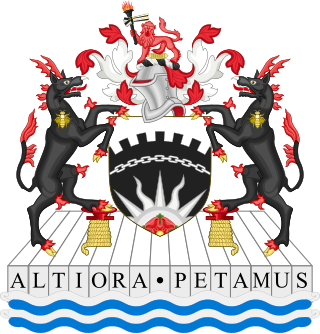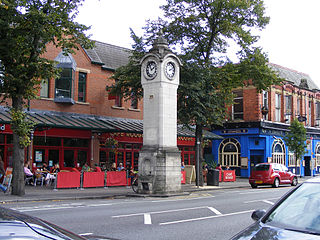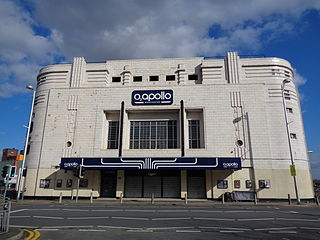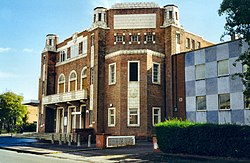
ABC Weekend TV was the popular name of the British broadcaster ABC Television Limited, which provided the weekend service in the Midlands and Northern England regions of the Independent Television (ITV) network from 1956 to 1968. It was one of the "Big Four" companies that between them produced the majority of ITV networked programmes during this period.

ITV Granada, formerly known as Granada Television, is the ITV franchisee for the North West of England and Isle of Man. From 1956 to 1968 it broadcast to both the north west and Yorkshire on weekdays only, as ABC Weekend Television was its weekend counterpart. Granada's parent company Granada plc later bought several other regional ITV stations and, in 2004, merged with Carlton Communications to form ITV plc.

Thames Television, commonly simplified to just Thames, was a franchise holder for a region of the British ITV television network serving London and surrounding areas from 30 July 1968 until the night of 31 December 1992. Thames Television broadcast from 09:25 Monday morning to 17:15 Friday afternoon at which time it would hand over to London Weekend Television (LWT).

The University of Salford is a public research university in Salford, Greater Manchester, England, 1 mile west of Manchester city centre. The Royal Technical Institute, Salford, which opened in 1896, became a College of Advanced Technology in 1956 and gained university status in 1967, following the Robbins Report into higher education.

Wilmslow Road is a major road in Manchester, England, running from Parrs Wood northwards to Rusholme. There it becomes Oxford Road and the name changes again to Oxford Street when it crosses the River Medlock and reaches the city centre.

KKTV is a television station in Colorado Springs, Colorado, United States, affiliated with CBS. The station is owned by Gray Television, and maintains studios on East Colorado Avenue in downtown Colorado Springs and a transmitter on Cheyenne Mountain.

Didsbury is a suburb of Manchester, England, on the north bank of the River Mersey, 5 miles south of Manchester city centre. The population at the 2011 census was 26,788.

The O2 Apollo Manchester (known locally as The Apollo and formerly Manchester Apollo and ABC Ardwick) is a concert venue in Ardwick Green, Manchester, England. It is a Grade II listed building, with a capacity of 3,500 (2,514 standing, 986 seats).

An anthology series is a written series, radio, television, film, or video game series that presents a different story and a different set of characters in each different episode, season, segment, or short. These usually have a different cast in each episode, but several series in the past, such as Four Star Playhouse, employed a permanent troupe of character actors who would appear in a different drama each week. Some anthology series, such as Studio One, began on radio and then expanded to television.

Associated British Picture Corporation (ABPC), originally British International Pictures (BIP), was a British film production, distribution and exhibition company active from 1927 until 1970 when it was absorbed into EMI. ABPC also owned approximately 500 cinemas in Britain by 1943, and in the 1950s and 60s owned a station on the ITV television network. The studio was partly owned by Warner Bros. from about 1940 until 1969; the American company also owned a stake in ABPC's distribution arm, Warner-Pathé, from 1958. It formed one half of a vertically integrated film industry duopoly in Britain with the Rank Organisation.
The Manchester School of Theatre is a tertiary school of theatre, drama and performance situated in the city of Manchester, founded in 1970. It is a part of Manchester Metropolitan University, and, in its work as a conservatoire, a member of the Federation of Drama Schools.

Media in Manchester has been an integral part of Manchester's culture and economy for many generations and has been described as the only other British city to rival to London in terms of television broadcasting. Today, Manchester is the second largest centre of the creative and digital industries in Europe.

The Playhouse Theatre, as of 2024 a community arts centre called the Niamos Centre, is a theatre in Hulme, Manchester, England. It is a grade II listed building. Originally built as the Hulme Hippodrome in 1902, the building has also been known as the Grand Junction Theatre, Junction Picture Theatre, The Playhouse, and the Nia Centre. Between 1955 and 1986 it was used as studios by the BBC and known as the BBC Playhouse.
The Queen's Park Hippodrome was a theatre in Harpurhey, Manchester, England. It was built on the site of an old tramshed and opened on 25 April 1904. It initially staged variety, dramas, pantomimes, and revues, which gave way to "sizzlingly saucy" French variety acts towards the end of the theatre's life.
The Alhambra Theatre in Higher Openshaw, Manchester, England, was opened in 1910, part of the H. D. Moorhouse Theatre Circuit, but it had been converted to a cinema by the outbreak of the First World War in 1914. The cinema was converted into a bingo hall in the early 1960s. The auditorium was finally used as a sporting club, and what remained of the building was used as a restaurant, storage space and glass works. The Alhambra was demolished in 2009 to make way for a new Morrisons supermarket.
The Prince's Theatre in Oxford Street, Manchester, England, was built at a cost of £20,000 in 1864. Under the artistic and managerial leadership of Charles Calvert, "Manchester's most celebrated actor-manager", it soon became a great popular success. The theatre's first production, Shakespeare's The Tempest, took place on 15 October 1864; Calvert himself played Prospero and his wife took the role of Miranda. The Times newspaper of 18 October reported that the 1,590-seat theatre "was exceedingly well filled", and declared the evening "a brilliant success". The theatre subsequently became synonymous with Calvert's elaborate and historically accurate Shakespearian productions.

New Broadcasting House (NBH) was the BBC's North West England headquarters on Oxford Road in Chorlton-on-Medlock, Manchester. The studios housed BBC Manchester, BBC North West, the BBC Philharmonic Orchestra and the BBC Religion and Ethics department. It was known as a Network Production Centre, the others being in Birmingham and Broadcasting House, Bristol.

Granada Studios is a television studio complex and events venue on Quay Street in Manchester, England, with the facility to broadcast live and recorded television programmes. The studios were the headquarters of Granada Television from 1956 to 2013. After a period of closure, five of the six studio spaces reopened in 2018. The studios are the oldest operating purpose-built television studios in the United Kingdom pre-dating BBC Television Centre by five years.

The Theatre Royal in Manchester, England, opened in 1845. Situated next to the Free Trade Hall, it is the oldest surviving theatre in Manchester. It was commissioned by Mancunian businessman John Knowles who wanted a theatre venue in the city.
This is a timeline of the history of the British television company ABC Weekend TV, one of the first four contractors of the Independent Television network.
















